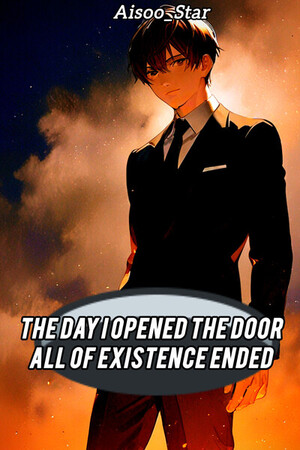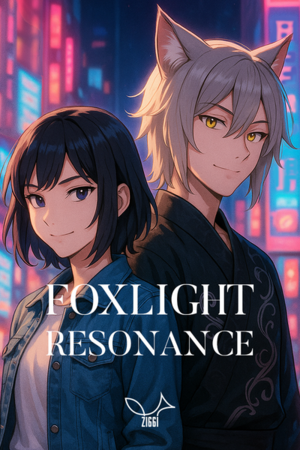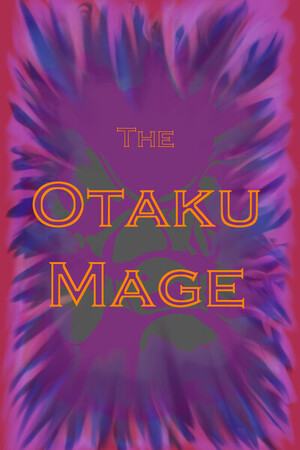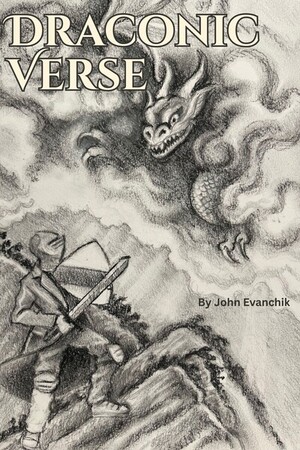Chapter 2:
Chapter 2: The Pristine Prison
The Day I Opened The Door All Of Existence Ended
The entrance to the castle wasn’t what I’d expected. I’d spent weeks imagining a fortress hidden by magic or geography, but it was right there, plain as day.
And that was the most unnerving part. It wasn’t hidden; it was minimal.
A single, massive door of aged oak, set so deep into the grey, weathered stonework that it seemed less like an entrance and more like a scar.
There were no handles, no keyholes, no visible means of opening it. It was just a slab of wood, a seamless, defiant part of the wall, rejecting the very idea of entry.
'Well, you’ve come this far,' I thought, the words loud and useless in my own head. 'What now? Knock?'
I raised a hand, my knuckles pausing an inch from the wood. The silence of the town at my back was a physical weight, pushing me forward.
I knocked. The sound was a dull, hollow thump, a pathetic noise that was instantly absorbed by the thick wood. It didn’t echo. It just died.
I waited. A minute. Two. I counted my own heartbeats, a frantic drum against my ribs.
Nothing. No scuff of a boot, no groan of a shifting lock, no curious voice from within. Just that oppressive, total silence.
It was a void, and my knock had been a pebble dropped into it, swallowed without a ripple.
Frustration prickled at me. I hadn’t come all this way to be stymied by a door.
I placed my palms flat against the rough, cool oak and pushed. It swung inward without a sound.
My breath hitched in my throat, a sharp, surprised gasp that was far too loud in the quiet.
I’d braced for resistance, for the immovable weight of ancient ironwork, for the shriek of an alarm, for something.
But there was nothing. It was just… open. The movement was smooth, effortless.
It felt less like an invitation and more like an act of supreme indifference.
Why would a god care about a lock? A door was a concept for things that needed to be kept in, or out.
This thing inside, I was starting to realize, was beyond such concerns.
Hesitantly, I stepped across the threshold into the cool, still air.
The moment my second foot left the cobblestones outside, the door swung shut behind me.
The sound was a soft, final 'whump', and the world plunged into near-total darkness.
I stood frozen, my heart hammering, waiting for my eyes to adjust. Slowly, shapes resolved from the gloom.
I was in a vast, high-ceilinged hall. My first, dizzying thought was that my informants, the terrified, broken souls on the outskirts of town, were utterly wrong. This wasn’t abandoned. It couldn’t be.
A place left empty for decades, let alone centuries, should have been a tomb. A thin, grey layer of dust should have coated every surface.
Cobwebs should have hung like tattered curtains from the candelabras.
The air should have been thick with the smell of rotting wood and damp stone, the profound chill of neglect that seeps into your bones.
Instead, the air was temperate, like a perfect spring afternoon.
The flagstones beneath my boots were clean, swept.
The great candelabras bolted to the walls held fresh, white candles, unlit but waiting. It was pristine. Preserved.
It wasn’t a abandoned castle; it was a museum exhibit, frozen the exact second the last person had walked out.
But as I stood there, the truth settled over me, colder than any neglect could have been.
No one had left. The feeling was absolute, a certainty that coiled in my gut. The people were gone, but the house… the house was still living. Breathing this silent, sterile breath.
“Hello?” I called out. The word left my lips and seemed to travel a few feet before the immense, hungry space swallowed it whole. It died a quick, quiet death. The silence that rushed in to fill its place was heavier and more profound than before.
I had to move. Standing in the entryway felt like being watched by a million blind eyes.
I walked deeper into the belly of the place. Room after room unfolded, each one a more perfect still-life than the last.
A sitting room with velvet-upholstered chairs arranged in a precise circle around a massive, cold fireplace.
A dining hall with a table long enough to seat fifty, set with gleaming silver and fine china for a banquet that was forever imminent, forever postponed.
A kitchen where copper pots and pans hung from hooks, shining as if just polished, waiting for a cook to come and prepare a meal for guests who would never arrive.
It was deeply unnerving. It was a photograph of a vibrant life, but all the people had been meticulously, painstakingly edited out.
My detective’s mind, my whole reason for being here, was useless.
It scrabbled for purchase like a rat on glass. There were no clues. No signs of a struggle, no overturned furniture, no dropped personal effects, no frantic scratches on a doorframe.
Nothing to indicate a why or a how. Just this… empty perfection. It was the cleanest crime scene I had ever witnessed, and it made my skin crawl.
I found a grand, sweeping staircase, its balustrades carved from some dark, polished wood, and I ascended.
The upper floors were more of the same: bedrooms with beds made tight enough to bounce a coin from, studies with desks so neat they looked staged.
It was on the second floor that I found the library.
Double doors of carved mahogany opened into a breathtaking circular room that rose two stories high.
Bookshelves lined every curved wall, crammed with thousands of volumes.
A ladder on a rolling brass rail gave access to the higher shelves.
And the smell, oh, the smell was different. Here, finally, was a hint of age: the rich, comforting scent of old paper, brittle leather, and the faint, peppery tang of dust.
It was a welcome, organic change from the sterile cleanliness of the rest of the castle. It felt real.
I wandered in, my boots whispering on the thick rug.
I ran my fingers along the spines of the books.
The titles were in languages I didn’t recognize, etched in gold leaf, accompanied by symbols that were vaguely geometric but somehow wrong, making my head ache if I looked at them for too long.
I caught words and phrases in Latin and Greek, Astronomia, Metaphysica, Theologica, but most were utterly alien.
This was no ordinary noble’s collection. This was an archive. And one book was waiting for me.
It sat on a small, elegant reading stand in the very center of the room, positioned under the great oculus of the dome.
It was as if it had been left out for a specific reader. For me.
Its cover was a dark, non-reflective material that seemed to drink the faint light, and it bore a single, twisted symbol that looked like a knot of thorns. It felt… prominent. Important.
Hesitantly, I reached out and opened it. The pages were thick parchment, handwritten in a crisp, precise script. And to my utter shock, it was in Japanese.
“On the Entity known as Zajorega,” the title page read.
I began to read, and a deep, primal dread began to uncoil in my stomach, a cold serpent stirring from sleep.
It spoke of a being that was not born, not created by any known god or primordial force. It had, according to the text, simply ‘willed itself’ into existence.
It was a conceptual anomaly, a thing that represented the pure, unchecked 'will to exist', and in doing so, it inherently represented the end of all that was not itself.
Its existence was a paradox that threatened the stability of all creation, a cancer on reality.
It didn’t seek destruction. It didn’t hate. It was simply that its existence necessitated the un-existence of everything else.
It was a vacuum, and all of creation was the air rushing in to fill it, only to be erased.
The book detailed failed attempts by ancient, forgotten civilizations to reason with it, to fight it, to escape it.
They all failed. It could not be fought. It could not be reasoned with. You could not hide. It was the end of every story, the final period on the last sentence of everything.
My hands were sweating. I turned to the final entry, my fingers leaving damp marks on the corner of the page.
“The Unknown,” it read, “those who are outside all things, heard the silent scream of a dying multiverse and intervened. They could not destroy Zajorega, for its self-willed existence is eternal. Instead, they forged a prison not of space, but of concept. They sealed it in a single, perfect moment of stillness, a place where its will to exist is perfectly balanced against a reality that does not change, does not grow, and thus, cannot be consumed. It is buried deep, where the world is forgotten. The seal must never be broken, for the moment it perceives a possibility beyond its prison, it will will that possibility into being, and all will cease.”
The words swam before my eyes. Zajorega.
This was what they had here. In this quiet, peaceful town. This was the source of their “bliss.”
It wasn’t peace. The brainwashing, the emotionless compliance of everyone I’d met… it wasn’t actually normal brain wash.
It was the washing, and manipulation of their brain, their reality.
It was to create perfect, unchanging, silent caretakers for a prison.
Their hollow, joyless lives were a sacrificial offering, a prayer of silence whispered every second of every day to keep the rest of the world turning.
Suddenly a soft sound made me jump.
It was a rustle. A whisper of movement on the rug from the doorway behind me.
I snapped the book shut, the sound like a gunshot in the silent room, and spun around.
The hallway was empty.




Please sign in to leave a comment.